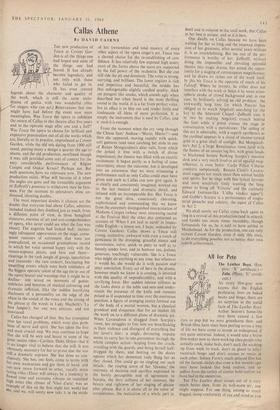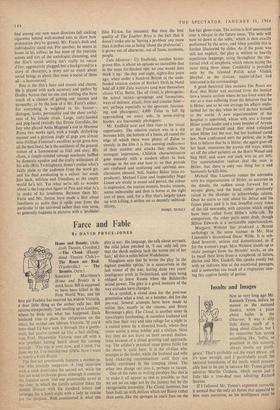All for Pete
The Leather Boys. (Em- pire; 'X' certificate.)— Zulu. (Plaza; 6U'. certifi- cate.)
As every film-goer now knows that the English
proletariat lives on baked 3 beans and bingo, there are no surprises in the social facts of The Leather Boys. Arthur Seaton's home-life may have caused a few eyes to pop but We were greenhorns then; and British films have since been putting across a way of life we have come to accept as widespread, if not quite universal. Indeed, it would take a brave film-maker now to show working-class people who actually cook, make beds, don't stack the washing up from week to, week, don't sit glued to telly/ racetrack/bingo and don't scream or swear at each other. Sidney Furie's much delayed -film has all the factual cliches that even a few months ago may have looked, like bold realism, and so suffers from the surfeit of similar bold realism we have had in the meantime.
Yet The Leather Boys comes out of it very much better than, from its well-worn air,, one might suppose. For one thing, among so much dogged, damp conformity of eye and mind as you
find among our new wave directors (all sticking cigarettes behind well-washed ears to show how proletarian they've grown), Mr. Furie's dash and individuality stand out. For another, he seems at home in his milieu; he has none of the touristic scenes and airs of the sociologist slumming, and the film's social setting isn't really its raison d'être, aggressively plugged, but a background to a story of character, a story not so much about social beings as about that most a-social of them all—a homosexual.
Pete is the film's hero and reason and charm. He is played with such accuracy and pathos by Dudley Sutton that no one and nothing else have much of a chance of getting our interest and sympathy; or by the look of it Mr. Furie's either, for everything is weighted in his favour— dialogue, looks, personality and the sheer awful- ness of his female rivals. Large, curly-headed and pug-faced (weirdly like Ettore Garofalo, the boy who played Anna Magnani's son in Mamma Roma two weeks ago), with a tough, skylarking manner and a glorious jingle of gags you almost miss (Gillian Freeman's excellent script gives him all the best lines), he is the antithesis of the general notion of a homosexual as frail and sissy. His chum, a simple-minded teenage mechanic baffled by domestic squalor and the crafty witlessness of his wife (Rita Tushingham), doesn't realise what's fairly plain to the audience from the word go; and his final awakening in a sailors' bar sends him back, wifeless and friendless, to the empty world he's left. Yet what we're left to wonder about is the long-shot figure of Pete and what he's to make of his loneliness. Between them Mr. Furie and Mr. Sutton have made a film about loneliness so acute that it spills over from the particular to the universal rather than vice versa, as generally happens in pictures with a 'problem' (like Victim, for instance). But then the best quality of The Leather Boys is the fact that it doesn't strike one as 'having a problem' any more than it strikes one as being 'about the proletariat': it grows out of character, out of faces, moments, people.
Zulu (director: Cy Endfield), another home- grown film, is about an episode so incredible that in the most far-fetched epic no one would dare think it up: the day and night, eighty-five years ago, when under a hundred British in the unde- fended mission station of Rorke's Drift in Natal held off 4,000 Zulu warriors (and won themselves eleven VCs). Battle, like all ritual, is photogenic; the actual tactics—groupings and formations, ways of defence, attack, feint and counter-feint- are, perhaps especially to the ignorant, fascinat- ing and photogenic; 4,000 Zulus in full fig approaching on every side, , in never-ending hordes, are fearsomely photogenic.
Mr. Endfield now and then rises to his visual opportunity. The mission station was in a dip between hills, the bottom of a basin, all round the edge of which there were plenty of Zulus to stretch; in the film it is this seeming endlessness of their number and attacks that makes the strongest impression. Childish characterisation goes uneasily with a modern effort to look carnage in the eye and hate it; so that periods are confused and confusing and spiritual ana- chronisms abound. Still, Stanley Baker (also co- producer), Michael Caine and (especially) Nigel Green are nicely in mood and period, the colour is impressive, the tension mounts, breaks, mounts, seems unbearable and then is borne at the right sort of pace, and, for a film that's largely taken up with killing, it strikes me as decently unblood- thirsty.
ISABEL QUIGLY







































 Previous page
Previous page